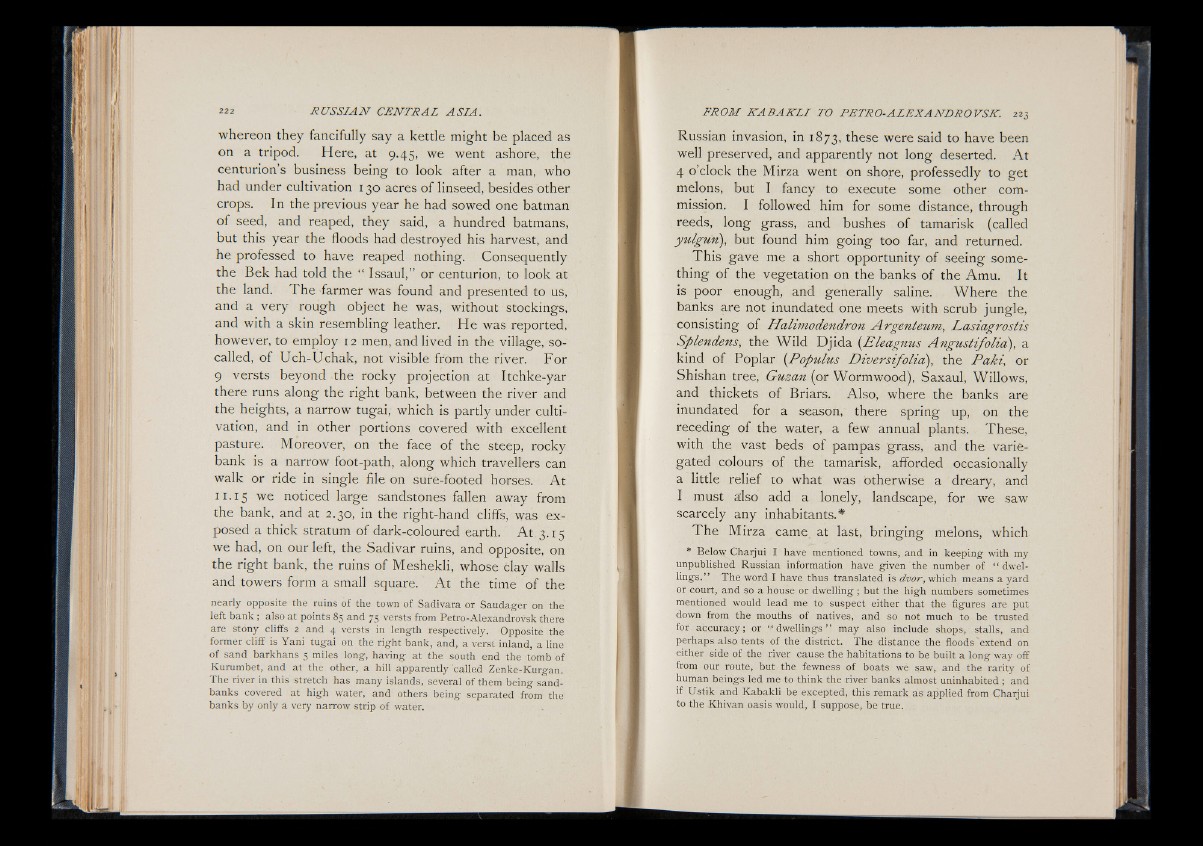
whereon they fancifully say a kettle might be placed as
on a tripod. Here, at 9.45, we went ashore, the
centurion’s business being to look after a man, who
had under cultivation 130 acres of linseed, besides other
crops. In the previous year he had sowed one batman
of seed, and reaped, they said, a hundred batmans,
but this year the floods had destroyed his harvest, and
he professed to have reaped nothing. Consequently
the Bek had told the “ Issaul,” or centurion, to look at
the land. The farmer was found and presented to us,
and a very rough object he was, without stockings,
and with a skin resembling leather. He was reported,
however, to employ 12 men, and lived in the village, so-
called, of Uch-Uchak, not visible from the river. For
9 versts beyond the rocky projection at Itchke-yar
there runs along the right bank, between the river and
the heights, a narrow tugai, which is partly under cultivation,
and in other portions covered with excellent
pasture. Moreover, on the face of the steep, rocky
bank is a narrow foot-path, along which travellers can
walk or ride in single file on sure-footed horses. A t
11.15 we noticed large sandstones fallen away from
the bank, and at 2.30, in the right-hand cliffs, was exposed
a thick stratum of dark-coloured earth. A t 3.15
we had, on our left, the Sadivar ruins, and opposite, on
the right bank, the ruins of Meshekli, whose clay walls
and towers form a small square. A t the time of the
nearly opposite the ruins of the town of Sadivara or Saudager on the
left bank; also at points 85 and 75 versts from Petro-Alexandrovsk there
are stony cliffs 2 and 4 versts in length respectively. Opposite the
former cliff is Yani tugai on the right bank, and, a verst inland, a line
of sand barkhans 5 miles long, having at the south end the tomb of
Kurumbet, and at the other, a hill apparently called ZenkerKurgan.
The river in this stretch has many islands, several of them being sandbanks
covered at high water, and others being separated from the
banks by only a very narrow strip of water.
Russian invasion, in 1873, these were said to have been
well preserved, and apparently not long deserted. A t
4 o’clock the Mirza went on shore, professedly to get
melons, but I fancy to execute some other commission.
I followed him for some distance, through
reeds, long grass, and bushes of tamarisk (called
yulgun), but found him going too far, and returned.
This gave me a short opportunity of seeing something
of the vegetation on the banks of the Amu. It
is poor enough, and generally saline. Where the
banks are not inundated one meets with scrub jungle,
consisting of Halimodendron Argenteum, Lasiagrostis
Splendens, the Wild Djida (Eleagnus Angustifolia), a
kind of Poplar (Populus Diversifolid), the P a ki, or
Shishan tree, Guzan (or Wormwood), Saxaul, Willows,
and thickets of Briars. Also, where the banks are
inundated for a season, there spring up, on the
receding of the water, a few annual plants. These,
with the vast beds of pampas grass, and the variegated
colours of the tamarisk, afforded occasionally
a little relief to what was otherwise a dreary, and
I must also add a lonely, landscape, for we saw
scarcely any inhabitants.*
The Mirza came, at last, bringing melons, which
* Belosy Charjui I have mentioned towns, and in keeping with my
unpublished Russian information have given the number of “ dwellings.”
The word I have thus translated is dvor, which means a yard
or court, and so a house or dwelling; but the high numbers sometimes
mentioned would lead me to suspect either that the figures are put
down from the mouths of natives, and so not much to be trusted
for accuracy; or ‘‘ dwellings” may also include shops, stalls, and
perhaps also tents of the district. The distance the floods'extend on
either side of the river cause the habitations to be built a long way off
from our route, but the fewness of boats we saw, and the rarity of
human beings led me to think the river banks almost uninhabited ; and
if Ustik and Kabakli be excepted, this remark as applied from Charjui
to the Khivan oasis would, I suppose, be true.